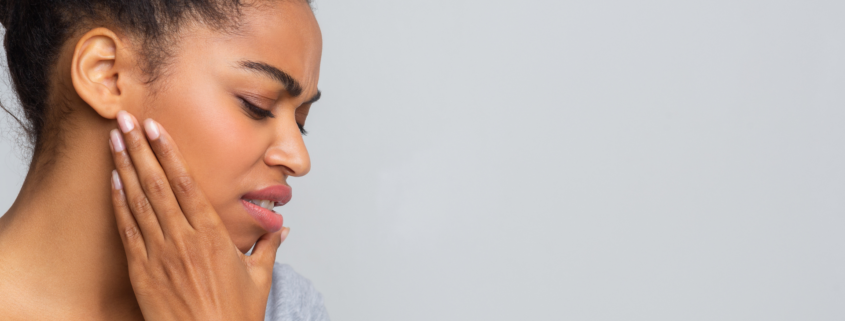TMJ Disorders: Symptoms, Causes & What You Can Do About It
What is TMJ?
TMJ stands for temporomandibular joint, or the jaw joint. Each person has two, one in front of each ear. The TMJ is the joint formed by the temporal bone of the skull with the lower jaw or mandible. This is the most highly used joint in the body. It moves every time we chew, talk or swallow. Unlike the shoulder or knee, which are ball-and-socket joints, the TMJ is a sliding joint. The sliding allows for pressure placed on the joint to be distributed throughout the joint and not just in one area.
Between the two bones that make up the TMJ is a disc, just like those between the bones on your back. Made primarily of cartilage, in the TMJ the disc acts like a third bone. Because it is attached to a muscle, the disc actually moves with certain movements.
Properly Functioning TMJ

A TMJ disorder is a disruption in the action of the jaw, usually accompanied by pain. There are a number of conditions affecting the function of the jaw that can cause one of these disorders. Fortunately, since the jaw is made up of bone and other living tissue, it is alive, making it capable of repair and healing. However, any malfunction prevents the complex system of muscles, bones and joints from working together in harmony. The result is a TMJ disorder – also known as TMD or CMD (cranio-mandibular dysfunction). Generally, a malfunction of one or both of these jaw joints is caused by trauma, whiplash, bad bite (malocclusion), poor posture, teeth grinding or skeletal malformation. It is estimated that one in every four people suffer from TMJ symptoms.
Displaced TMJ

People with TMJ problems generally experience one or more of the following symptoms:
- Chronic recurring headaches
- Clicking, popping or grating sound in the jaw joints
- Earaches, congestion or ringing ears
- Limited jaw opening or locking
- Dizziness
- Pain when chewing
- Neck and/or throat pain
- Difficulty in closing the teeth together
- Tired, tight jaws
- Pain behind the eyes
- Tenderness and pain in muscles of the face and neck
- Swallowing difficulty
- Pain in the tongue, gums or cheek muscles
- Teeth grinding or clenching
TMJ can be treated using a nightguard specifically for TMJ, or a TMJ appliance.
Back to our services













